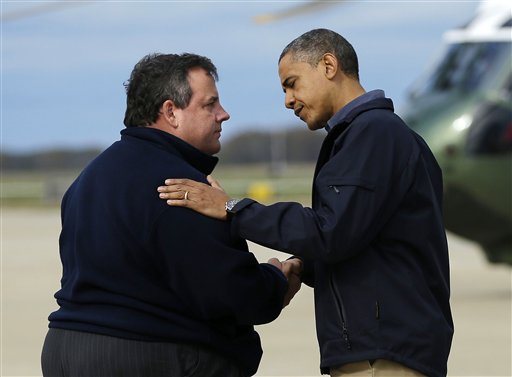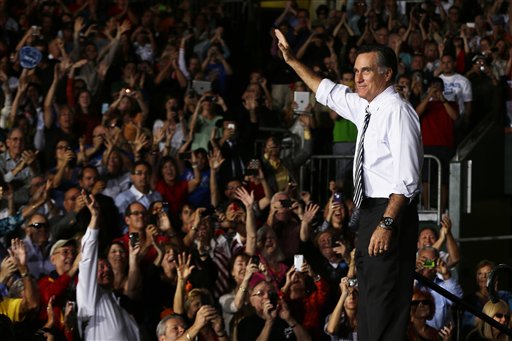ATLANTIC CITY, N.J. — President Barack Obama got an up-close look at the devastation wrought by superstorm Sandy on Wednesday, forsaking partisan campaigning days before the close election in favor of a disaster tour guided by the Republican governor of New Jersey. Rival Mitt Romney muted criticism of his foe as he barnstormed battleground Florida.
Yet a controversy as heated as any in the long, intense struggle for the White House flared over Romney’s late-campaign television and radio ads in bellwether Ohio. “Desperation,” Vice President Joe Biden said of the broadcast claims that suggested automakers General Motors and Chrysler are adding jobs in China at the expense of Ohio workers. “One of the most flagrantly dishonest ads I can ever remember.”
Republicans were unrepentant as Romney struggled for a breakthrough in the Midwest.
“American taxpayers are on track to lose $25 billion as a result of President Obama’s handling of the auto bailout, and GM and Chrysler are expanding their production overseas,” said an emailed statement issued in the name of Republican running mate Paul Ryan.
The two storms — one inflicted by nature, the other whipped up by rival campaigns — were at opposite ends of a race nearing its end in a flurry of early balloting by millions of voters, unrelenting advertising and so many divergent public opinion polls that the result was confusion, not clarity.
National surveys make the race a tight one for the popular vote, with Romney ahead by a statistically insignificant point or two in some, and Obama in others.
Both sides claim an advantage from battleground state soundings that also are tight. Obama’s aides contend he is ahead or tied in all of them, while Romney’s team counters that his campaign is expanding in its final days into what had long been deemed safe territory for the president in Michigan, Pennsylvania and Minnesota.
The storm added yet another element of uncertainty, as Obama spent a third straight day embracing his role as incumbent and Romney tried to tread lightly during a major East Coast disaster.
The president received a briefing at the Federal Emergency Management Agency across town from the White House before flying to New Jersey, where the shoreline absorbed some of the worst damage in a storm that killed 50 and laid waste to New York City’s electrical and transportation systems.
Gov. Chris Christie was waiting when Air Force One landed, and he and Obama, two figures in blue windbreakers, walked together toward the president’s helicopter to begin their tour. It was a tableau that seemed impossible a week ago — a president struggling to defend his economic record in a tight election, flying off to a non-battleground state to spend the afternoon in the company of the man who delivered the keynote address at Romney’s Republican National Convention this summer.
The storm forced an abrupt change in Romney’s campaign, as well.
A spokesman, Kevin Madden, told reporters the president’s challenger maintained a “positive tone and talked about what the governor would hope to do on day one of his presidency.
Romney told his crowd in Tampa, “We love all of our fellow citizens. We come together at times like this, and we want to make sure that they have a speedy and quick recovery from their financial and, in many cases, personal loss.” His criticism of Obama was glancing. “I don’t just talk about change. I actually have a plan to execute change and make it happen.”
But the clash was ferocious over Romney’s broadcast ads. The radio version said that after Obama’s auto bailout, General Motors “cut 15,000 American jobs, but they are planning to double the number of cars built in China which means 15,000 more jobs for China.
“And now comes word that Chrysler is starting to build cars in, you guessed it, China.”
Biden said the ads were scurrilous, and he noted that executives from General Motors and Chrysler, which produces Jeeps, had said the claims were inaccurate.
“Ladies and gentlemen, the truth is, just recently in the last couple of months, in Toledo, Ohio, not only is the Jeep plant open and churning out Jeeps, they announced they’re adding 1,100 new jobs.”
Ryan’s emailed response conceded nothing. “President Obama has chosen not to run on the facts of his record, but he can’t run from them,” it said.
His reference to a $25 billion cost to taxpayers reflected the Treasury Department’s most recent estimate of the amount General Motors and Chrysler still owe the government from the financing it received during a managed bankruptcy in 2009.
Ryan didn’t mention that the two companies have repaid billions more than that. Nor did he refer to Obama’s frequent claim that the administration’s bailout, which Romney opposed, saved large numbers of jobs and prevented the collapse of the U.S. auto industry itself.
Obama’s aides said the president would return to political travel on Thursday with stops in Wisconsin, Nevada and Colorado. But for one more day, he was hands-on commander of the federal response to Sandy, and consoler-in-chief for its victims.
He and Christie flew by helicopter over washed-out roads, flooded homes, boardwalks bobbing in the ocean, and in Seaside Heights, a fire still burning after ruining about eight structures.
The president’s itinerary also included a community center in Brigantine Beach that is serving as a shelter for local storm victims. Officials said about 200 people were sleeping in the center’s gym at the height of the storm, a number that has been reduced.
The political impact of the storm on the race was difficult to gauge.
Obama senior adviser David Axelrod told reporters it had “tended to freeze this race” in place because “people are focused on the storm. That’s what’s been in the news.”
Not everyone, and not all the time.
In the race’s final days, Romney’s campaign is running ads in Minnesota and Pennsylvania, two states long considered safe for the president, and the Republican’s allies are airing commercials in Michigan and New Mexico.
Obama’s aides insisted the states were safe for him, but it dispatched former President Bill Clinton to Minnesota, and purchased airtime in the other three states to respond to the Republicans.
Both campaigns invested in get-out-the-vote operations well in advance of Election Day.
Officials in Florida said more than 2.6 billion ballots had been cast as of Tuesday night. Democrats voted in slightly higher numbers than Republicans, but nearly 450,000 voters were independents.
Send questions/comments to the editors.




Comments are no longer available on this story